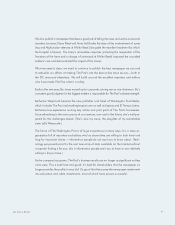Washington Post 2007 Annual Report Download - page 21
Download and view the complete annual report
Please find page 21 of the 2007 Washington Post annual report below. You can navigate through the pages in the report by either clicking on the pages listed below, or by using the keyword search tool below to find specific information within the annual report.As a general matter, schools participating in Title IV programs are not financially responsible for the failure of their
students to repay Title IV loans. However, the Department of Education may fine a school for a failure to comply with
Title IV requirements and may require a school to repay Title IV program funds if it finds that such funds have been
improperly disbursed. In addition, there may be other legal theories under which a school could be subject to suit as a
result of alleged irregularities in the administration of student financial aid.
Pursuant to Title IV program regulations, a school that undergoes a change in control must be reviewed and recertified
by the Department of Education. Certifications obtained following a change in control are granted on a provisional
basis that permits the school to continue participating in Title IV programs, but provides fewer procedural protections if
the Department of Education asserts a material violation of Title IV requirements. In accordance with Department of
Education regulations, a number of the schools in Kaplan’s Higher Education Division are combined into groups of two
or more schools for the purpose of determining compliance with Title IV requirements. Including schools that are not
combined with other schools for that purpose, the Higher Education Division has 36 Title IV reporting units; of these, 5
reporting units have been provisionally certified, while the remaining 31 are fully certified.
If the Department of Education were to find that one reporting unit in Kaplan’s Higher Education Division had failed to
comply with any applicable Title IV requirement and as a result limited, suspended or terminated the Title IVeligibility of
the school or schools in that reporting unit, that action normally would not affect the Title IV eligibility of the schools in
other reporting units that had continued to comply with Title IV requirements. The largest Title IV reporting unit in the
Higher Education Division in terms of revenue is Kaplan University, which accounted for approximately 48% of the
Title IV funds received by the Division in 2007. For the most recent year for which final data are available from the
Department of Education, the cohort default rate for Kaplan University was 5.95%, and the cohort default rates for the
other Title IV reporting units in Kaplan’s Higher Education Division averaged 9.33%; no reporting unit had a cohort
default rate of 25% or more. In 2007, Kaplan University derived less than 85% of its receipts from the Title IV programs,
and other reporting units derived an average of less than 81% of their receipts from Title IV programs, with no unit
deriving more than 88% of its receipts from such programs.
No proceeding by the Department of Education is currently pending to fine any Kaplan school for a failure to comply
with any Title IV requirement, or to limit, suspend or terminate the Title IV eligibility of any Kaplan school. As noted
previously, to remain eligible to participate in Title IV programs, a school must maintain its accreditation by an
accrediting agency recognized by the Department of Education. As previously reported, in December 2006 four
schools in one Title IV reporting unit received notice that their accreditor did not intend to renew the schools’
accreditation due to the failure to meet certain completion and placement requirements. Kaplan closed three of the four
schools and sought and received new accreditation from a different accrediting body for the fourth school. In 2007,
no Kaplan school received notice from its accreditors indicating that the school’s accreditation was being withdrawn
or that the school was being issued a show cause order.
No assurance can be given that the Kaplan schools currently participating in Title IV programs will maintain their Title IV
eligibility in the future or that the Department of Education might not successfully assert that one or more of such schools
have previously failed to comply with Title IV requirements.
All of the Title IV financial aid programs are subject to periodic legislative review and reauthorization. In addition,
while Congress historically has not limited the amount of funding available for the various Title IV student loan
programs, the availability of funding for the Title IV programs that provide for the payment of grants is wholly contingent
upon the outcome of the annual federal appropriations process.
Whether as a result of changes in the laws and regulations governing Title IV programs, a reduction in Title IV program
funding levels or a failure of schools included in Kaplan Higher Education to maintain eligibility to participate in Title IV
programs, a material reduction in the amount of Title IV financial assistance available to the students of those schools
would have a significant negative impact on Kaplan’s operating results. In addition, any development that has the
effect of making the terms on which Title IV financial assistance is made available materially less attractive could also
adversely affect Kaplan’s operating results.
Newspaper Publishing
The Washington Post
WP Company LLC (“WP Company”), a subsidiary of the Company, publishes The Washington Post, which is a
morning daily and Sunday newspaper primarily distributed by home delivery in the Washington, D.C., metropolitan
area, including large portions of Maryland and northern Virginia.
2007 FORM 10-K 5
























